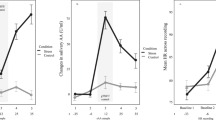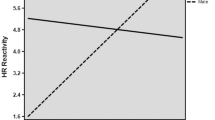Abstract
Prior studies have demonstrated inconsistent relationships between the trait of hostility and cardiovascular responses to stress. To examine the hypothesis that only a subset of hostile subjects demonstrates greater cardiovascular responses to stress, we assessed relationships among hostility, defensiveness, and cardiovascular responses to stress in 33 healthy men and 34 healthy women. Stressors used were math and speech tasks. Median splits on Cook-medley Hostility Inventory (Ho) and defensiveness [Marlowe-Crowne Social Desirability scale (MC)] classified subjects into four groups: (a) Defensive Hostile (DH-high Ho and MC), (b) Low Hostile (LH-low Ho and MC), (c) High Hostile (HH-high Ho, low MC), and (d) Defensive (Def-low Ho, high MC). Results indicate that Defensive Hostility is differentially related to cardiovascular levels in men and women. DH men exhibited greater systolic blood pressure (SBP) levels than LH, Def, and HH men. Analyses of diastolic blood pressures (DBPs) suggested a trend that LH and DH men demonstrated greater DBP levels than Def and HH men. In contrast, DH women were indistinguishable from HH and Def women with respect to blood pressure, and LH women demonstrated the lowest SBP and DBP levels. There were no personality differences in cardiovascular change scores to stress. Gender differences for affect were observed which may mediate the cardiovascular responses. These data suggest that the personality trait of Defensive Hostility may provide significant associations with blood pressure levels and coronary disease associations with blood pressure levels and coronary disease in studies that do not find associations using hostility alone.
Similar content being viewed by others
References
Helmers KF, Posluszny D, Krantz DS: Associations of hostility and coronary artery disease: A review of studies. In Siegman A, Smith T (eds),Anger, Hostility, and the Heart. Hillsdale, NJ: Lawrence Erlbaum Associates, 1994, 67–96.
Smith T: Hostility and health: Current status of a psychosomatic hypothesis.Health Psychology. 1992,11:139–150.
Matthews K, Glass D, Rosenman R, Bortner R: Competitive drive, pattern A, and coronary heart disease: A further analysis of some data from the Western Collaborative Group Study.Journal of Chronic Diseases. 1977,30:489–498.
Barefoot JC, Dahlstrom WG, Williams RB: Hostility, CHD incidence, and total mortality: A 25-year follow-up study of 255 physicians.Psychosomatic Medicine. 1983,45:59–63.
Barefoot JC, Dodge K, Peterson B, et al: The Cook-Medley Hostility Scale: Item content and ability to predict survival.Psychosomatic Medicine. 1989,51:46–57.
Koskenvuo M, Kaprio J, Rose R, et al: Hostility as a risk factor for mortality and ischemic heart disease in men.Psychosomatic Medicine. 1988,50:330–340.
Powell L, Thoresen C: Behavioral and physiologic determinants of long-term prognosis after myocardial infarction.Journal of Chronic Diseases. 1985,38:253–263.
Levy D, Wilson P, Anderson KM, Castelli WP: Stratifying the patient at risk from coronary disease: New insights from the Framingham Heart Study.American Heart Journal. 1990,119:712–716.
Krantz DS, Manuck SB: Acute psychophysiologic reactivity and risk of cardiovascular disease: A review and methodologic critique.Psychological Bulletin. 1984,96:435–464.
Suarez EC, Williams RB: Situational determinants of cardiovascular and emotional reactivity in high and low hostile men.Psychosomatic Medicine. 1989,51:404–418.
Weidner G, Friend R, Ficarrotto TJ, Mendell NR: Hostility and cardiovascular reactivity to stress in women and men.Psychosomatic Medicine. 1990,51:36–45.
McCranie E, Watkins L, Brandsma J, Sisson G: Hostility, coronary heart disease (CHD) incidence, and total mortality: Lack of association in a 25-year follow-up study of 478 physicians.Journal of Behavioral Medicine. 1986,2:119–125.
Hearn M, Murray D, Luepker R: Hostility, coronary heart disease, and total mortality: A 33-year follow-up study of university students.Journal Behavioral Medicine. 1989,12:105–121.
Leon GR, Finn SE, Bailey JM: The inability to predict cardiovascular disease from MMPI special scales related to Type A patterns.Psychosomatic Medicine. 1987,49:205.
Smith MA, Houston BK: Hostility, anger expression, cardiovascular responsivity, and social support.Biological Psychology. 1987,24:39–48.
Sallis JF, Johnson CC, Trevorrow TR, et al: The relationship between cynical hostility and blood pressure reactivity.Journal of Psychosomatic Research. 1987,31:111–116.
Helmers KF, Krantz DS, Bairey Merz CN, et al: Defensive hostility: Relationship to multiple markers of cardiac ischemia in patients with coronary disease.Health Psychology. 1995,14:202–209.
Williams RB, Haney T, Lee K, et al: Type A behaviour, hostility: and coronary heart disease.Psychosomatic Medicine. 1980,42:539–549.
Jamner L, Shapiro D, Goldstein I, Hug R: Ambulatory blood pressure and heart rate in paramedics: Effect of cynical hostility and defensiveness.Psychosomatic Medicine. 1991,53:393–406.
Polefrone JM, Manuck SB: Gender differences in cardiovascular and neuroedocrine response to stressors. In Barnett R, Biener L, Baruck G (eds),Gender and Stress. New York: The Free Press, 1987, 13–38.
Hastrup JL, Light KC. Sex differences in cardiovascular stress responses: Modulation as a function of menstrual cycle phases.Journal of Psychosomatic Research. 1984,28:475–483.
Krantz DS, Helmers KF, Bairey CN, et al: Cardiovascular reactivity and mental stress-induced myocardial ischemia in patients with coronary artery disease.Psychosomatic Medicine. 1991,53:1–12.
Cook W, Medley D: Proposed hostility and pharasaic-virtue scales for the MMPI.Journal of Applied Psychology. 1954,38:414–418.
Crowne DP, Marlowe D:The Approval Motive: Studies in Evaluative Dependence. New York: John Wiley & Sons, Inc., 1964.
Manuck SB, Kasprowicz AL, Muldoon MF: Behaviorally evoked cardiovascular reactivity and hypertension: Conceptual issues and potential associations.Annals of Behavioral Medicine. 1990,12:17–29.
Anderson NB, Williams RB, Lane JD, Monou H: The relationship between hostility and cardiovascular responsivity following a mild harrassment intervention.Psychosomatic Medicine. 1984,21:568.
Houston BK, Smith MA, Cates DS: Hostility patterns and cardiovascular reactivity to stress.Psychophysiology. 1989,26:337–342.
Weinberger D, Schwartz G, Davidson R: Low-anxious, high-anxious, and repressive coping styles: Psychometric patterns and behavioral and physiological responses to stress.Journal of Abnormal Psychology. 1979,88:369–380.
Author information
Authors and Affiliations
Additional information
Preparation of this manuscript was supported in part by grants from the USUHS (R07233) and NHLBI (HL47337 and HL07380). The opinions and assertions expressed herein are those of the authors and should not be construed as representing the views of the USUHS or the Department of Defense.
Karin F. Helmers was a recipient of a research fellowship from the Medical Research Council of Canada and a computer equipment grant from Marion Merrell Dow, Inc.
This study was conducted as part of a doctoral dissertation by the first author.
We gratefully acknowledge the assistance of Ivan Graf for his help during the data collection.
About this article
Cite this article
Helmers, K.F., Krantz, D.S. Defensive hostility, gender and cardiovascular levels and responses to stress. Ann Behav Med 18, 246–254 (1996). https://doi.org/10.1007/BF02895286
Issue Date:
DOI: https://doi.org/10.1007/BF02895286




